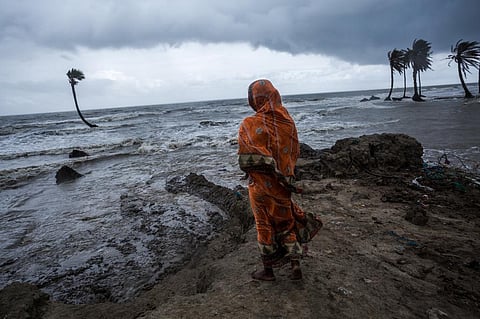Climate change is symptom of broader issue of ecological overshoot: William Ripple
Extreme weather events are no longer once-in-a lifetime for India. Photo: iStock
Global temperatures continue to break records — there were six record-breaking months in 2023 so far along with two record-breaking seasons and November 2023 was the warmest November ever recorded. 2023 also saw the highest number of days with global mean temperatures above 1.5 degrees Celsius and one-day temperatures also breached 2°C warming point for the first time in November 2023.
We are also witnessing the consequences of a warming planet. Extreme weather events are no longer once-in-a lifetime for India; there was a disaster nearly every day from January-September, 2023 in the country.
A study published on October 24, 2023 in journal BioScience offered a snapshot of Earth’s status on 35 “planetary vital signs” with regards to climate. The analysis shows that humans have reached new extremes on 20 of these measurements, including global gross domestic product, fossil fuel subsidies, annual carbon pollution and glacier thinning. Overall, the report considers human activities, such as deforestation and meat consumption, as well as the planet’s responses to those activities, including characteristics such as ice loss and temperature changes.
Richard Mahapatra speaks to William Ripple, distinguished professor of ecology at Oregon State University, the director of the Alliance of World Scientists, an independent organisation and co-author of the research, about the consequences of record-breaking temperatures and future climate impacts on humanity. Edited excerpts:
Richard Mahapatra (RM): Scientists have warned that the planet is entering uncharted territory. What does it mean for us? Isn’t this a situation we created but never expected the consequences to be so severe?
William J Ripple (WR): The global temperature and ice extent records being broken by enormous margins are a major cause for concern because we are now leaving climate conditions associated with human civilisation. Future climate impacts will likely include substantially more frequent extreme weather events, and some regions could eventually become uninhabitable.
RM: Every passing year seems to be a deadly breach of existing records. But the year 2023 is turning out to be a breach of foundational tipping. Do you agree with this? Your paper mentioned “striking are the enormous margins which 2023 conditions are exceeding past extremes”. Will you elaborate on what these foretell?
WR: Already, in 2023, we have witnessed many climate records being broken and the occurrence of large climate-related disasters, including powerful storms, floods, and heat waves. In addition, the massive wildfires in Canada suggest some forests may have reached a tipping point, where they could then shift into a new regime.
RM: The frequency of extreme weather events, spreading heatwaves and natural weather phenomena like El Nino and La Nina changing characters induced by climate change brings up the question of whether the planet is entering a climate that might not be suitable for living, particularly for homosapiens. Our species has thrived in the last few thousands years due to a suitable climate niche.
WR: We are concerned that the Earth’s climate is transitioning to a state that could ultimately result in many millions of deaths. Consequently, limiting future warming by reducing greenhouse gas emissions should be a top priority. We will also need more efforts to support climate change adaptations, especially in the most vulnerable regions.
RM: The statement said “20 of 35 vital signs are now showing record extremes”. Any system, particularly an ecosystem, would collapse if its vitals were damaged in this way. Do you see a scenario in which so many vitals collapsing together would result in an ultimate meltdown that we would not know how to fix?
WR: As indicated by the many vital signs at record extremes, climate change is a symptom of the broader issue of ecological overshoot, wherein humanity’s consumption of resources has become unsustainable. We also need to worry about related consequences of overshoot, including biodiversity loss, fresh water scarcity, pandemics, world hunger and social-economic injustice.
To address this underlying threat will require equitable policies that support the well-being of all people while curtailing overconsumption by the wealthy. An insufficient response could lead to an array of catastrophic outcomes, potentially including partial societal collapse.
RM: In the fight against the climate emergency, equality is the principle that must guide us, as the statement has also emphasised. Here is the pertinent question: How do we establish “equity” as there is a huge gap between the two poles of the economy/consumption? It raises two additional questions: How will the high consumers reduce their consumption? Second, how will low consumers (mostly poor and developing country) manage growth within the set limit? A tricky situation, but do you think it needs an entirely different growth model?
WR: We believe that new economic and policy approaches will be needed to reduce consumption by the wealthy and support better social outcomes for people with low incomes. As a possible starting point, a global carbon tax could be used to effectively limit excessive consumption and emissions, while also providing funding for sustainable economic development and climate adaptation efforts, especially in the Global South.
RM: The food system is under scrutiny now for an emission curb. As you have mentioned, there is an immediate need to shift to plant-based diets, besides other mitigation steps. Changes in diet are already an issue that polarises and is also intimately linked to local ecology and, thus, food habits.
WR: From a policy perspective, a transition towards more plant-based diets could take many forms, including reduced meat and dairy subsidies where applicable, increased availability of plant-based options in schools and greater support for the development of environmentally-friendly meat analogues.


